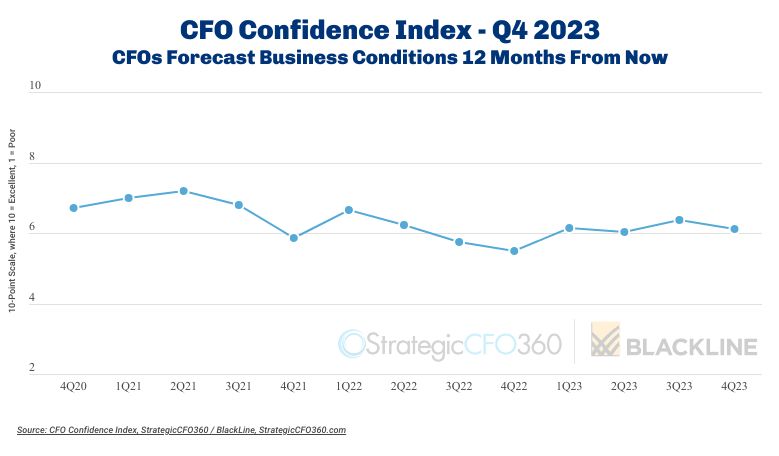And the volatility continues.
After a highly optimistic wave across the C-Suite in the third quarter, our latest polling of senior executives this month—from CEOs to CHROs and board members—shows fears of a recession are back on the table, driving down confidence among America’s top business leaders. Now CFOs are weighing in too.
Every quarter, StrategicCFO360 polls CFOs at organizations of all sizes and sectors around the country to form the basis of our CFO Confidence Index, which measures sentiment on a 10-point scale where 10 is Excellent and 1 is Poor. The survey, conducted in partnership with BlackLine, takes two measures: one for CFO confidence in current business conditions, and one for CFO forecasts for what the business environment will look like a year from now.
Q4 data, collected among 149 qualified CFOs October 23-26, shows CFOs’ forecasts for business in the year ahead have shifted downward, as a high cost of capital, potentially new rate hikes by year end, shrinking demand, geopolitical turmoil and an upcoming presidential election in the U.S. slow business growth.
More precisely, our leading indicator retracted nearly 4 percent this quarter, to 6.1—from 6.4 in Q3, when most believed that the Fed was ready to pause—and likely end—its quantitative tightening. And CFOs’ rating of current business conditions stayed relatively flat, at 6.1 as well.
“There is too much uncertainty in the market at this point and generally, the consequences of interest rate hikes lag and hit the economy in about 6-12 months,” said one of the CFOs participating in the survey. “Also, 2024 is an election year. Based on the data I have been analyzing, I am expecting a recession to hit sometime first half of 2024.”
“Customer needs are not as high in volume as 2022/2021 dictated. There is a lot of uncertainty with our customers, which has impacted our forward looking 12 months to more adjusted historical averages,” said the CFO of a privately held transportation company.
“Speed of business has dropped dramatically,” said the CFO of a VC-backed software company. “Decisions that were made within a month over the past 5 years are now taking months.”
Overall, the proportion of CFOs projecting conditions to improve by this time next year dropped 9 percent in Q4, to 38 percent from 42 percent in Q3. Instead, a full third now expect conditions to deteriorate—an increase of 48 percent from Q3.
But, perhaps not all is lost. At the current 6.1 level, our forward-looking indicator is back in line with where it started the year—and 11 percent higher than it was at this time last year (5.5/10), perhaps an indicator that although uncertainty and challenges remain, so does hope that a recovery is getting nearer.
Michael Polaha, SVP finance transformation and strategy at BlackLine, says the key to dealing with any business or economic uncertainty is to have timely, accurate and actionable data, and “the investment strategy of many corporations is still to leverage technology, especially investments that result in accelerated time to value and provide the necessary insight and intelligence into the business and its operations.”
C-Suite Comparison
CFOs aren’t the only ones feeling the slowdown in business. Every other member of the C-Suite our parent company, Chief Executive Group, has polled this month reports a decline in optimism for 2024.
Sister publication Chief Executive’s October polling of CEOs found them bracing for a recession, too, with 58 percent expecting a recession or at least a slowdown over the next 12 months.
Then, only 29 percent of public company board members, polled by Corporate Board Member in the first two weeks of October, said they expect conditions to improve in the next 12 months—down from 45 percent at the beginning of the year.
Even CHROs, which tend to be more optimistic than their peers, according to our data, reported waning optimism for the months ahead.
More specifically, when asked to rate current business conditions, on our 10-point scale, and what they expect the business environment to look like 12 months from now, the numbers matched up. From 5.8 to 6.1, all senior executives polled were aligned on what they’re seeing today and what they expect will transpire next year.
The Year Ahead
When asked how all of this is likely to affect their respective companies, the proportion of CFOs forecasting increased profitability a year from now remained flat vs. Q3, at 61 percent, and those expecting revenues to grow increased to 77 percent, from 74 percent in Q3—both signs that CFOs trust their companies have implemented the right measures to navigate this difficult economic environment.
Part of those measures may well be in setting the right capital allocation strategy—mainly cost containment. Our data found a declining proportion of CFOs planning to up capex and hiring in 2024: 32 percent said they plan to increase capital expenditures next year—down from 35 percent in Q3—and 46 percent plan to increase hiring—down from 49 percent in Q3.
Polaha isn’t surprised. “Economic factors warrant a more focused capital allocation strategy,” he says, “and investments in technology that allow for workforce agility and scale, while providing management with the ability to pivot the workforce, are bubbling to the top.”
He has observed that things like the automation of repetitive tasks tops the to-do list for many leaders today, thanks to the perpetual benefits these investments render.
And when asked about their debt and cash positions, 27 percent expect to increase debt (vs. 24 percent in Q3) and 47 percent plan to increase their cash position (unchanged since Q3).
About the CFO Confidence Index
The CFO Confidence Index is a recurring flash poll of CFOs and finance chiefs on their perspective of the economy and how policies and current events are affecting their companies and strategies. Throughout the year, StrategicCFO360 surveys hundreds of CFOs across America, at organizations of all types and sizes, to compile our CFO Confidence Index data. The Index, which we produce in partnership with BlackLine, tracks confidence in current and future business environments, as well as their forecast for their company’s revenue, profit, capex and cash/debt ratio for the year ahead. Learn more at StrategicCFO360.com/CFO-Confidence-Index








